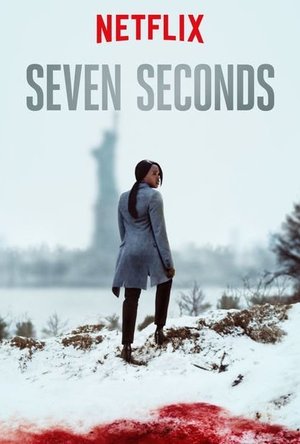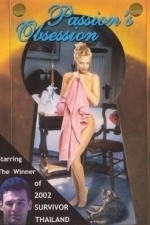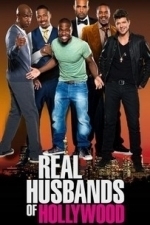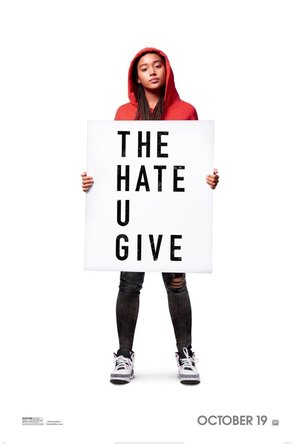Search

Seven Seconds - Season 1
TV Season Watch
When 15-year-old black cyclist Brenton Butler dies in a hit-and-run accident -- with a white police...
Crim Drama
Phillip McSween (751 KP) rated The Hate U Give (2018) in Movies
Feb 11, 2019
Masterpiece, One of the Best of 2018
After witnessing a murder, black high school student Starr Carter (Amandla Stenberg) decides to stand up against racism while dealing with her own internal conflict of self-identity.
Acting: 10
Beginning: 8
The toughest part about critiquing is having to say something isn’t perfect, but not really having any ideas as to how to fix it. The beginning was…good. Characters are introduced as you meet the Carter family for the first time. It definitely could have been better, however. I felt it dragged on for slightly too long, but at the same time I understand director George Tillman Jr. was going for an emotional connection. While it could’ve been better, it is solid enough of a start to get you into the movie.
Characters: 10
The film revolves around Starr and her family. Each family member contributes to the overall dynamic of the story. You can see how Starr is shaped by her strong father Maverick (Russell Hornsby) who is all about standing up for what’s right and protecting the family at all costs. Her mother Lisa (Regina Hall) just wants Starr to have a better life than herself growing up. Starr recognizes that and tries to embrace it, but also feels guilty while doing so. It was therapeutic watching Starr evolve into a woman after feeling so powerless in the earlygoings of the film. All of these characters, even those outside of the Carter family, have depth and add value to the story.
Cinematography/Visuals: 10
Conflict: 10
Genre: 8
Memorability: 10
The Hate U Give is packed with twists and turns that you don’t expect or see coming. It really is a small world that we live in, too small to go around hating each other. The film succeeds by showing us just how small this world is. There are a number of memorable scenes that remain etched in my brain long after watching the movie. It’s one of those films that stays with you, leaving you with cause for much thought.
Pace: 9
There were a few spots where the build-up was a bit slow, but it’s not a major issue that impacts the movie as a whole. This goes back to what I was mentioning in the beginning. Not perfect, but I’m not sure how much I would have done differently than Tillman Jr. For the most part, the movie is highly entertaining and has a consistent flow.
Plot: 10
Resolution: 10
Ended just the way it should, not with some fairytale conclusion, but reality. Thank God for justice, but the movie leaves us with the full understanding that there is still work yet to be done. Very strong messaging.
Overall: 95
The Hate U Give is not your typical race war movie as it pushes for peace in coexistence and challenges the ideas of self-identification. The dynamics involved here are truly interesting as you see a black vs. white vs. hood life going on and what happens when lines cross. With a solid cast and story, it is not a surprise that this is one of my favorite films of 2018.
Acting: 10
Beginning: 8
The toughest part about critiquing is having to say something isn’t perfect, but not really having any ideas as to how to fix it. The beginning was…good. Characters are introduced as you meet the Carter family for the first time. It definitely could have been better, however. I felt it dragged on for slightly too long, but at the same time I understand director George Tillman Jr. was going for an emotional connection. While it could’ve been better, it is solid enough of a start to get you into the movie.
Characters: 10
The film revolves around Starr and her family. Each family member contributes to the overall dynamic of the story. You can see how Starr is shaped by her strong father Maverick (Russell Hornsby) who is all about standing up for what’s right and protecting the family at all costs. Her mother Lisa (Regina Hall) just wants Starr to have a better life than herself growing up. Starr recognizes that and tries to embrace it, but also feels guilty while doing so. It was therapeutic watching Starr evolve into a woman after feeling so powerless in the earlygoings of the film. All of these characters, even those outside of the Carter family, have depth and add value to the story.
Cinematography/Visuals: 10
Conflict: 10
Genre: 8
Memorability: 10
The Hate U Give is packed with twists and turns that you don’t expect or see coming. It really is a small world that we live in, too small to go around hating each other. The film succeeds by showing us just how small this world is. There are a number of memorable scenes that remain etched in my brain long after watching the movie. It’s one of those films that stays with you, leaving you with cause for much thought.
Pace: 9
There were a few spots where the build-up was a bit slow, but it’s not a major issue that impacts the movie as a whole. This goes back to what I was mentioning in the beginning. Not perfect, but I’m not sure how much I would have done differently than Tillman Jr. For the most part, the movie is highly entertaining and has a consistent flow.
Plot: 10
Resolution: 10
Ended just the way it should, not with some fairytale conclusion, but reality. Thank God for justice, but the movie leaves us with the full understanding that there is still work yet to be done. Very strong messaging.
Overall: 95
The Hate U Give is not your typical race war movie as it pushes for peace in coexistence and challenges the ideas of self-identification. The dynamics involved here are truly interesting as you see a black vs. white vs. hood life going on and what happens when lines cross. With a solid cast and story, it is not a surprise that this is one of my favorite films of 2018.
Bob Mann (459 KP) rated The Hate U Give (2018) in Movies
Sep 28, 2021
It’s a turf war on a global scale.
I saw this as part of a “Secret Cinema” event by Cineworld cinemas in the UK. That’s where you go to see a pre-release movie without knowing what it is going to be. It’s an interesting litmus test for a) a movie’s upfront marketing appeal (how many people get up and walk out when the BBFC title appears) and b) the “grab ’em early” appeal of the movie itself (how many people get up and walk out during the first 20 minutes of so).
I’m afraid this movie didn’t do very well on either a) or b) at my showing: about 20 people left immediately, and more tellingly about another 20 people left in the first half hour. There’s a reason for that: the first half hour of this film is goddamn awful!
Starr Carter (Amandla Stenberg) is a sixteen year-old resident of Garden Heights, a black neighbourhood in a US city, where she lives with her younger brother and step-brother. Their parents Maverick (Russell Hornsby, “Fences“) and Lisa (Regina Hall) are devoting all of their energies to “break the cycle” and get their kids out of the neighbourhood and off to college and better futures. As such, the kids attend not the rough-house local school but a much more upper-class establishment: there Starr has to play a different role, with links to her origins being kept hidden even from her white boyfriend Chris (K.J. Apa).
But all that changes when her boyhood friend Khalil (Algee Smith) is shot and killed in a police stop-and-search. As the only witness, and with Khalil linked to local gang lord King (Anthony Mackie), Starr’s anonymous world is about to get a national focus shone onto it.
Man… I hate voiceovers in films and always have. So I really hated the start of this film which has Starr narrating ABSOLUTELY EVERYTHING (“Blah, blah, blah..”): no audience discovery is required. It also starts with a sort of highschool romance vibe, but not one that’s well done with kissing (“Blah, blah, blah..”) while the local Mean Girls look on (“Blah, blah”) then with Starr’s friends trying to act street (“blah, blah”) while Starr tries not to be street, all to the constant droning of Starr’s voiceover (“Blah, blah, blah..”). (I never walk out of movies…. but I can kind of understand the rationale of those who did).
Fortunately the voiceover then largely recedes (it only pops up with occasional staccato “thoughts”, before storming back for a “blah, blah” finale). And with the shooting, the film takes on a much more interesting slant, giving Amandla Stenberg a chance to really shine.
I have commented on Ms Stenberg before: she was the only really good thing in the recent “The Darkest Minds“. Here she exhibits a tremendous range from the delighted (her smile is radiant and seems astonishingly unforced) to the heartbroken and furious. There’s also a really strong supporting cast with great turns from Hornsby, Hall, Mackie and Smith. Hornsby in particular I found great as the Dad desperately tutoring his kids in military (but loving) fashion to avoid his mistakes.
For me, this seemed to be a surprisingly atypical view of a black ghetto-living family. A scene set in a diner is genuinely touching at emphasising the loving and close-knit nature of the Carter family.
Where I will struggle here is in trying to interpret my overall feelings about the film. As a white, older male person I have three degrees of separation from Starr’s perspective. And these are undoubtedly difficult issues to juggle with. The riots that happened recently in towns like Ferguson ape the activities on screen uncomfortably. Your sympathies might lie to some degree with the unfortunate white police officer (Drew Starkey); sympathies supported by the views of Starr’s police officer uncle Carlos (Common): until Starr points out via a punchy question that you REALLY shouldn’t feel like that… and your views are brought up with a jolt.
Aside from the rights and wrongs of the incident, there’s a frustrating dichotomy at play in the film with black and white communities wanting to be treated equally but never wanting to be treated the same. “You don’t SEE me” wails Starr. “I see you” replies Chris (as if James Cameron was directing!) But does he really? Without colour, I do not consider myself to be remotely capable of fully understanding Starr’s perspective on life. It made me want to read the source novel by Angie Thomas to try to get better insight.
Directed by George Tillman Jr., it’s undoubtedly a mixed bag, but I came down in the end on the side of it being good rather than bad… it has certainly had me thinking for a couple of days. The clumsy voiceovers and story elements in the opening and closing scenes mask a number of parallel and interesting story strands that generate conflicting thoughts about the state of race relations in today’s America. Jackson sang “It doesn’t matter if you’re black or white”: and it really shouldn’t, but actually in some quarters, it clearly still does.
I’m afraid this movie didn’t do very well on either a) or b) at my showing: about 20 people left immediately, and more tellingly about another 20 people left in the first half hour. There’s a reason for that: the first half hour of this film is goddamn awful!
Starr Carter (Amandla Stenberg) is a sixteen year-old resident of Garden Heights, a black neighbourhood in a US city, where she lives with her younger brother and step-brother. Their parents Maverick (Russell Hornsby, “Fences“) and Lisa (Regina Hall) are devoting all of their energies to “break the cycle” and get their kids out of the neighbourhood and off to college and better futures. As such, the kids attend not the rough-house local school but a much more upper-class establishment: there Starr has to play a different role, with links to her origins being kept hidden even from her white boyfriend Chris (K.J. Apa).
But all that changes when her boyhood friend Khalil (Algee Smith) is shot and killed in a police stop-and-search. As the only witness, and with Khalil linked to local gang lord King (Anthony Mackie), Starr’s anonymous world is about to get a national focus shone onto it.
Man… I hate voiceovers in films and always have. So I really hated the start of this film which has Starr narrating ABSOLUTELY EVERYTHING (“Blah, blah, blah..”): no audience discovery is required. It also starts with a sort of highschool romance vibe, but not one that’s well done with kissing (“Blah, blah, blah..”) while the local Mean Girls look on (“Blah, blah”) then with Starr’s friends trying to act street (“blah, blah”) while Starr tries not to be street, all to the constant droning of Starr’s voiceover (“Blah, blah, blah..”). (I never walk out of movies…. but I can kind of understand the rationale of those who did).
Fortunately the voiceover then largely recedes (it only pops up with occasional staccato “thoughts”, before storming back for a “blah, blah” finale). And with the shooting, the film takes on a much more interesting slant, giving Amandla Stenberg a chance to really shine.
I have commented on Ms Stenberg before: she was the only really good thing in the recent “The Darkest Minds“. Here she exhibits a tremendous range from the delighted (her smile is radiant and seems astonishingly unforced) to the heartbroken and furious. There’s also a really strong supporting cast with great turns from Hornsby, Hall, Mackie and Smith. Hornsby in particular I found great as the Dad desperately tutoring his kids in military (but loving) fashion to avoid his mistakes.
For me, this seemed to be a surprisingly atypical view of a black ghetto-living family. A scene set in a diner is genuinely touching at emphasising the loving and close-knit nature of the Carter family.
Where I will struggle here is in trying to interpret my overall feelings about the film. As a white, older male person I have three degrees of separation from Starr’s perspective. And these are undoubtedly difficult issues to juggle with. The riots that happened recently in towns like Ferguson ape the activities on screen uncomfortably. Your sympathies might lie to some degree with the unfortunate white police officer (Drew Starkey); sympathies supported by the views of Starr’s police officer uncle Carlos (Common): until Starr points out via a punchy question that you REALLY shouldn’t feel like that… and your views are brought up with a jolt.
Aside from the rights and wrongs of the incident, there’s a frustrating dichotomy at play in the film with black and white communities wanting to be treated equally but never wanting to be treated the same. “You don’t SEE me” wails Starr. “I see you” replies Chris (as if James Cameron was directing!) But does he really? Without colour, I do not consider myself to be remotely capable of fully understanding Starr’s perspective on life. It made me want to read the source novel by Angie Thomas to try to get better insight.
Directed by George Tillman Jr., it’s undoubtedly a mixed bag, but I came down in the end on the side of it being good rather than bad… it has certainly had me thinking for a couple of days. The clumsy voiceovers and story elements in the opening and closing scenes mask a number of parallel and interesting story strands that generate conflicting thoughts about the state of race relations in today’s America. Jackson sang “It doesn’t matter if you’re black or white”: and it really shouldn’t, but actually in some quarters, it clearly still does.



